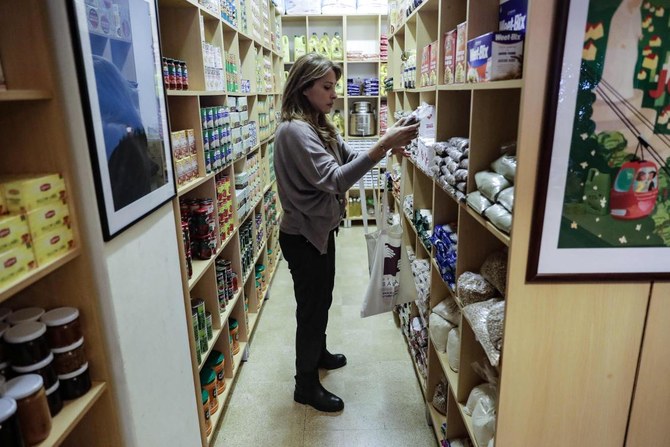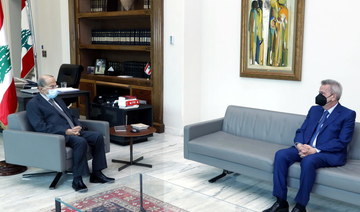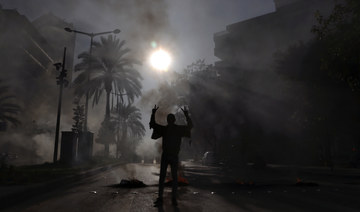BEIRUT: To feed her family, Lebanese mother Sandra Al-Tawil sold her fridge and washing machine. Now she fears the cash-strapped state will scrap food subsidies, plunging them deeper into poverty.
Lebanon is locked in its worst economic crisis since the 1975-1990 civil war, with no end in sight.
The value of the Lebanese pound has plunged, driving up the price of crucial imports like food and fuel and triggering small but angry protests.
More than half of Lebanon’s population is poverty stricken and relies on subsidies, but a central bank demand for “an immediate plan to ration subsidies” is looming.
“We’re already tightening our belts. What will we eat if we can no longer buy rice or lentils?” 40-year-old Tawil said.
Tawil and her husband lived a comfortable life in Dubai before returning to their homeland to open a high-end hair salon in 2019.
But that dream turned to nightmare after the financial crisis and the COVID-19 pandemic hit.
“I had to sell my washing machine and fridge... just to get the minimum of daily bread and pay rent,” said the mother of two young children.
Her husband found a job at the start of the year, and the Beit El Baraka charity is helping them out with food and school fees.
But Tawil is still worried, and furious with the political class she blames for the malaise.
“If I see people heading out to protest, I’ll be the first to join them,” she said.
In a country that imports 80 percent of its food, much of the six million population depends on subsidies to get by.
Even without them being lifted, many are already struggling, said Beit El Baraka founder Maya Ibrahimchah.
“There have been many more demands for help over the past four months,” she said.
“Those we are helping today are all from the middle class.”
The state has poured up to $437 million into subsidies a month, the World Bank estimates, to keep prices in check for bread, medicine, fuel and electricity, as well as around 300 other items since mid-2020.
To counter the pound’s drastic devaluation, importers get access to dollars at a preferential rate to ensure they can afford to continue bringing in supplies.
For flour, fuel and medicine, for example, they offer dollars at the official exchange rate of 1,507 pounds to cover most of their cost.
But traders must resort to the black market to cover the difference, where Tuesday the rate hit a record low of 10,000 pounds to the dollar.
As a result, in less than a year the price of a large bag of subsidised bread has risen from 1,500 to 2,500 pounds.
Authorities have remained vague about how the subsidies will be reduced, though meetings are ongoing.
In early December, central bank governor Riad Salameh said it could only fund subsidies for another two months. Later that month, he said two billion dollars were available for them.
At the end of February, the central bank’s website showed it had $17.9 billion in foreign currency reserves, yet $17.5 billion of that is the bank’s required reserves.
The bank did not respond to AFP’s repeated requests for comment.
The UN food agency has warned any subsidy reduction would have “major inflationary repercussions” and “put an unbearable strain on households.”
The price of bread could increase by up to three times and fuel by 4.5 times, the World Food Programme said, adding it was critical to immediately scale up assistance to the poorest.
Under the government’s latest plan, subsidies could be gradually lifted, with financial aid to soften the blow over several years.
The state would first lift subsidies for bread, fuel and around 300 other items, under the plan seen by AFP, before later on reviewing spending in the electricity sector.
To compensate, up to 80 percent of the population would receive handouts — 50 dollars a month for adults aged over 23 and half for anybody younger.
Those amounts, and the numbers of beneficiaries, would then progressively diminish.
Until then, the authorities have secured $246 million from the World Bank to help 786,000 Lebanese.
But Nasser Jomaa, 52, said he doubted the government would really provide any financial support.
“It’s just empty words. We have zero faith in the state,” said the driver, who lives with his unemployed 25-year-old son.
As the Lebanese pound has plunged on the black market, he has seen his monthly income drop in value from $1,000 to just $160.
He added that any lifting of subsidies would be “catastrophic.”
Already, he said, “we no longer eat meat.”
Lebanese dread end to subsidies as economic crisis bites
https://arab.news/59nmq
Lebanese dread end to subsidies as economic crisis bites

Open Forum Riyadh to discuss digital currency, AI, and mental health

- The event will run in parallel to the WEF’s Special Meeting on Global Collaboration
LONDON: The Open Forum Riyadh — a series of public sessions taking place in the Saudi capital on Sunday and Monday — will “spotlight global challenges and opportunities,” according to the organizers.
The event, a collaboration between the World Economic Forum and the Saudi Ministry of Economy and Planning, will run in parallel to the WEF’s Special Meeting on Global Collaboration, Growth and Energy for Development, taking place in Riyadh on April 28 and 29.
“Under Saudi Vision 2030, Riyadh has become a global capital for thought leadership, action and solutions, fostering the exchange of knowledge and innovative ideas,” Faisal F. Alibrahim, Saudi minister of economy and planning, said in a press release, adding that this year’s Open Forum being hosted in Riyadh “is a testament to the city’s growing influence and role on the international stage.”
The forum is open to the public and “aims to facilitate dialogue between thought leaders and the broader public on a range of topics, including environmental challenges, mental health, digital currencies, artificial intelligence, the role of the arts in society, modern-day entrepreneurship, and smart cities,” according to a statement.
The agenda includes sessions addressing the impact of digital currencies in the Middle East, the role of culture in public diplomacy, urban development for smart cities, and actions to enhance mental wellbeing worldwide.
The annual Open Forum was established in 2003 with the goal of enabling a broader audience to participate in the activities of the WEF, and has been hosted in several different countries, including Cambodia, India, Jordan and Vietnam.
The panels will feature government officials, artists, civil-society leaders, entrepreneurs, and CEOs of multinationals.
This year’s speakers include Yazeed A. Al-Humied, deputy governor and head of MENA investments at the Saudi Pubic Investment Fund; Princess Reema Bandar Al-Saud, Saudi Arabia’s ambassador to the US; and Princess Beatrice, founder of the Big Change Charitable Trust and a member of the British royal family.
Michele Mischler, head of Swiss public affairs and sustainability at the WEF, said in a press release that the participation of the public in Open Forum sessions “fosters diverse perspectives, enriches global dialogue, and empowers collective solutions for a more inclusive and sustainable future.”
Meituan looks to hire in Saudi Arabia, indicating food delivery expansion

SHANGHAI: Chinese food delivery giant Meituan is seeking to hire staff for at least eight positions based in Riyadh, in a sign it may be looking to Saudi Arabia to further its global expansion ambitions, according to Reuters.
The jobs ads, which is hiring for KeeTa, the brand name Meituan uses for its food delivery operations in Hong Kong, is seeking candidates with expertise in business development, user acquisition, and customer retention, according to posts seen by Reuters on Linkedin and on Middle Eastern jobs site Bayt.com.
Meituan did not immediately respond to a request for comment by Reuters on its plans for Saudi expansion.
Bloomberg reported earlier on Friday that the Beijing-based firm would make its Middle East debut with Riyadh as the first stop.
Since expanding to Hong Kong in May 2023, Meituan’s first foray outside of mainland China, speculation has persisted that its overseas march would continue as the firm searches for growth opportunities, with the Middle East rumored since last year to be one area of possible expansion.
“We are actively evaluating opportunities in other markets,“ Meituan CEO Wang Xing said during a post-earnings call with analysts last month.
“We have the tech know-how and operational know-how, so we are quietly confident we can enter a new market and find an approach that works for consumers there.”
IMF opens first MENA office in Riyadh

RIYADH: The International Monetary Fund has opened its first office the Middle East and North Africa region in Riyadh.
The office was launched during the Joint Regional Conference on Industrial Policy for Diversification, jointly organized by the IMF and the Ministry of Finance, on April 24.
The new office aims to strengthen capacity building, regional surveillance, and outreach to foster stability, growth, and regional integration, thereby promoting partnerships in the Middle East and beyond, according to the Saudi Press Agency.
Additionally, the office will facilitate closer collaboration between the IMF and regional institutions, governments, and other stakeholders, the SPA report noted, adding that the IMF expressed its appreciation to Saudi Arabia for its financial contribution aimed at enhancing capacity development in its member countries, including fragile states.
Abdoul Aziz Wane, a seasoned IMF director with an extensive understanding of the institution and a broad network of policymakers and academics worldwide, will serve as the first director of the Riyadh office.
Saudi minister to deliver keynote speech at Automechanika Riyadh conference

RIYADH: Saudi Arabia’s Deputy Minister of Investment Transaction Saleh Al-Khabti is set to deliver the keynote speech at a global automotive aftermarket industry conference in Riyadh.
Set to be held from April 30 April to May 2 in the Saudi capital’s International Convention and Exhibition Center, Automechanika Riyadh will welcome more than 340 exhibitors from over 25 countries.
Al-Khabti will make the marquee address on the first day of the event, which will also see participation from Aftab Ahmed, chief advisor for the Automotive Cluster at the National Industrial Development Centre, Ministry of Industry and Mineral Resources.
Saudi Arabia’s automotive sector is undergoing a transformation, with the Kingdom’s Public Investment Fund becoming the major shareholder in US-based electric vehicle manufacturer Lucid, and also striking a deal with Hyundai to collaborate on the construction of a $500 million-manufacturing facility.
Alongside this, Saudi Arabia’s Crown Prince Mohammed bin Salman launched the Kingdom’s first electric vehicle brand in November 2022.
Commenting on the upcoming trade show, Bilal Al-Barmawi, CEO and founder of 1st Arabia Trade Shows & Conferences, said: “It is a great honor for Automechanika Riyadh to be held under the patronage of the Saudi Arabian Ministry of Investment, and we’re grateful for their continued support as the event goes from strength-to-strength.
“The insights and support we’ve already received have been invaluable, and we look forward to continuing this relationship throughout the event and beyond.”
This edition of Automechanika Riyadh will feature seven product focus areas, including parts and components, tyres and batteries, and oils and lubricants.
Accessories and customizing, diagnostics and repairs, and body and paint will also be discussed, as well as care and wash.
Aly Hefny, show manager for Automechanika Riyadh, Messe Frankfurt Middle East, said: “The caliber of speakers confirmed to take part at Automechanika Riyadh is a testament to the event’s growth and prominence within the regional automotive market.
“We have developed a show that goes beyond the norm by providing a platform that supports knowledge sharing and networking while promoting the opportunity to engage with key industry experts and hear the latest developments, trends and innovations changing the dynamics of the automotive sector.”
Aramco-backed S-Oil expects Q2 refining margins to remain steady then trend upward

SEOUL: South Korea’s S-Oil forecast on Friday that second-quarter refining margins will be steady, supported by regular maintenance in the region, then trend upward in tandem with higher demand as the summer season gets underway, according to Reuters.
Over the January-March period, the refiner said it operated the crude distillation units at its 669,000-barrel-per-day oil refinery in the southeastern city of Ulsan at 91.9 percent of capacity, compared with 94 percent in October-December.
S-Oil, whose main shareholder is Saudi Aramco, plans to shut its No. 1 crude distillation unit sometime this year for maintenance, the company said in an earnings presentation, without specifying the time.


















